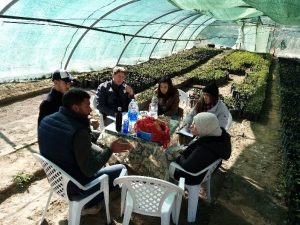
William ‘Bill’ Nichols served as a volunteer consultant through the United States Agency for International Development’s Farmer-to-Farmer Program (USAID F2F) for two weeks in January 2020. From New Mexico, his collaboration as an F2F volunteer improved the tree nursery production of four cooperatives in southern Morocco. One immediate benefit of his visits with Moroccan farmers at their respective nursery sites was that he was able to meet and network with individuals whose technical skills could benefit not only their own, but also cooperatives in the same province.
The groups he worked with acted upon Bill’s observation and coordinated capacity-building workshops. Now, for example, the members of the Women’s Cooperative of Tassa Ouirgane participate in monthly technical trainings facilitated by Hassan, a father of two in his thirties who impressed Bill during his visit to another nearby cooperative, that of Imdoukal Znaga.
This lasting outcome is deeply relevant to worldwide F2F programming today, as we experience global health-related travel restrictions which inhibit U.S.-based volunteers from sharing their expertise with growers in the field and around the world.
The F2F program responds to the local needs of host-country farmers and organizations in developing and transitional countries. It leverages the expertise of volunteers from U.S. farms, universities, cooperatives, agribusinesses, and nonprofits. It will be profoundly helpful for emerging agricultural cooperatives if all of USAID’s 35 F2F country programs were authorized to enable local experts like Hassan to complete new assignments. Bill’s connection-making has benefited several cooperatives in this way, illuminating its necessity in our new global reality.
During Bill’s visits, he offered guidance to sustainably maximize the quality and quantity of organic fruit trees which directly coincided with the current F2F implementer in Morocco, the High Atlas Foundation (HAF), developing project plans with donor partners. HAF, a Moroccan-U.S. foundation, assists local communities in identifying and managing critical projects. Immediately after Bill and Hassan determined the need to prioritize more efficient water delivery systems at Imdoukal Znaga, the local F2F-HAF team then communicated the material needs and costs to FENELEC, a federation of Moroccan companies that then provided funding for a solar pumping component and the training necessary to operate it. Bill’s assignment was incredibly timely, during Morocco’s planting season, when partners are driven to plant as much and as well as possible.
Actually, his timing was fortunate in several ways. Early in the season, cooperative members had considered the amount of seedlings to plant with the expected returns. Bill supported them in their cost-benefit analysis. Their price review and (re)evaluation are thanks to Bill’s visit, as are the operational budgets of the nurseries recently funded by Ecosia, a German search engine that finances reforestation around the world.
Bill’s work on pricing trees was immediately utilized by the cooperatives. This enabled them to meet the rigorous project criteria of established international donors. As a result, Ecosia now supports planting 150,000 seeds of almond, carob, olive, and walnut trees at the nurseries of the four cooperatives where Bill provided assessments, including Akrich Village and the Adrar Cooperative, where he also catalyzed a soil analysis.
That F2F volunteers excel in Morocco and around the world speaks both to their skill-set and character. Bill’s diverse knowledge and vast experience in technical, financial, and managerial matters is exceptional, but his wholehearted generosity is also noteworthy. It must also be said that volunteers require a conducive context that enables the potential of their work to be achieved. Timing matters of course, but what may matter more to success is the prior preparation done by local cooperatives, with their members having seized the opportunity to attain consensus on their goals through participatory dialogue. Achieving community consensus, they are ready to implement the agricultural project plans that they themselves have created.
The High Atlas Foundation is dedicated to building these collaborative and empowering experiences with cooperatives before F2F volunteers arrive so that their recommendations are directed toward what is most needed and wanted. Finally, cooperatives more often consider recommendations and accomplish their objectives with new partnerships that are contributive, as was the case with Bill’s successful assignment to assist Moroccan people in advancing transformative initiatives.
Since its inception in 1985, the John Ogonowski and Doug Bereuter Farmer-to-Farmer Program of USAID has supported volunteers from all 50 states in their completion of over 15,000 assignments in more than 115 countries. It is an honor for the High Atlas Foundation to implement this program in Morocco, made even more meaningful as HAF was founded by former Peace Corps volunteers. Bill’s success continues to ripple. Upon their reflection we can see that the global positives of F2F – and of Peace Corps fielding more than 235,000 volunteers since 1962 – are incalculable.
*****
Dr. Yossef Ben-Meir is president of the High Atlas Foundation and a sociologist. The High Atlas Foundation is a Moroccan association and a U.S. 501(c)(3) nonprofit organization founded in 2000 and committed to furthering sustainable development. HAF supports Moroccan communities to take action in implementing human development initiatives. HAF promotes organic agriculture, women’s empowerment, youth development, education, and health. Since 2011, HAF has Consultancy Status at the United Nations Economic and Social Council.
This article was written as part of the Addressing Global Crisis Project (AGC), which is run by the University of Central Florida’s Office of Global Perspectives & International Initiatives (GPII). AGC examines how governments, individually and collectively, deal with pandemics, natural disasters, ecological challenges, and climate change. AGC is organized around five primary pillars: (1) delivery of services and infrastructure; (2) water-energy-food security; (2) governance and politics; (4) economic development; and, (5) national security. Through its global network, AGC facilitates expert discussion and features articles, publications and online content.